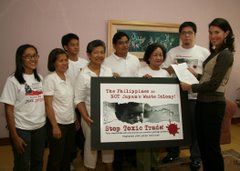As early as 6 a.m., more than 50 members of the MJJC congregated at the Welcome Rotunda in España Ave., raising the banner “Walang Ilusyon, Walang Kondisyon, JPEPA Di Solusyon!” At 10 a.m. members of the MJJC held a creative demonstration at the Quezon Memorial Circle, and protest activities culminated at around 2 p.m. in Pasay City, before the Senate gates, where at least 600 MJJC members congregated and held a three-hour vigil over the Senate proceedings as they begun deliberating on the proposed conditional concurrence for the ratification of JPEPA.

“The executive branch negotiated away the future of the Filipino people. By signing an unconstitutional and unfair treaty, the President sold the Philippines at a bargain without the people’s consent. These are the very acts that the Senate Committee on Foreign Relations and the Committee on Trade and Commerce wish to nevertheless bless with a vote of approval,” stated the group in their formal statement.
The JPEPA was signed by Pres. Arroyo and Prime Minister Junichiro Koizumi of Japan back September 2006 in Finland. Ever since the treaty has been heavily criticized by a wide-swath of sectors from nurses, farmers, fisherfolks, environmentalists, labor, academia, public health groups, and even Japanese civil society groups have joined the fray.
Last week over 100 Japanese individuals and groups sent an e-mail letter to the Senate raising the concern of the Philippines receiving their toxic wastes, and acknowledging that “"The potential for job creation for the Philippine people under JPEPA, as argued by the Japanese and Philippine governments, will in reality be extremely small when compared with the jobs lost as a result of the destruction of Philippine industry and agriculture caused by JPEPA."
The MJJC has released various briefs on the JPEPA’s impact on nurses, the environment, constitutionality, labor, agriculture, and investments, and continues to expose how lopsided the JPEPA is in favor of the Japanese.

According to Atty. Golda Benjamin, lead counsel of the MJCC, “We were generous even where we had cause to be stingy with the Japanese. Fish, crustaceans and mollusks are excluded from the WTO Uruguay Round commitments of member countries because developed countries refused to reduce their export subsidies especially those on fishing vessels. Despite this the Philippines still bound its tariffs at the WTO, albeit at very high rates. Japan did not. Of the 200 tariff lines for fish products in Japan’s JPEPA schedule, 59 are forever excluded from duty-free treatment; 15 are for deferred market access negotiations; 72 for phased tariff removal; and, 25 duty free from year 1. Of the 114 in the Philippine schedule, 46 will enjoy duty-free treatment from year 1 while the remaining 68 are subject to phased tariff removal. Not a single fish escaped our net or was excluded.”
“The welfare of the Filipinos, our country, should never be compromised!” stressed Dr. Leah Paquiz, President of the Philippine Nurses Association, an MJJC partner. “The conditional concurrence that Senators Defensor-Santiago and Roxas are advocating is simply unacceptable to us. We need leaders who will pull all of us together, not abandon us one by one. The conditional concurrence only addresses an aspect of an atrocious treaty. Our leaders should stop putting band-aids on JPEPA, and simply put it to rest.”
For more details:
Atty. Golda Benjamin, Lead Counsel Magkaisa Junk JPEPA Coalition, mobile: 0917 314 1016
Dr. Leah Paquiz, President, Philippine Nurses Association, mobile: 0917 852 0918






1 comment:
In fightingFTA’s website, its observations are quite enlightening for us non-experts in international trade agreements, which reads:
“Under North-South FTAs, the market access for the South is generally very small. For the Japan-Philippines Economic Partnership Agreement (JPEPA), Japan got improved access to the Philippines automobile market, new fishing opportunities in the Philippine seas (to replace imports), stronger investment guarantees and even the green light to export toxic wastes, while the Philippines got reduced tariff rates on a few exported fruits and a quota to be able to send 100 nurses a year to Japan, In the Japan-Thailand deal, Japan got major investment opportunities in the automobile and health sectors, while Thailand goat a measly quota to send chefs and masseuses to Japan.” (Today’s FTA Frenzy)
On government’s claim that Philippines will lose investment opportunities worth P 4 billion, well fightingFTA’s wrote, in the same article, that:
“Several World Bank and UNCTAD studies show that there is no direct relationship between signing an investment agreement and receiving increased foreign investment. China, South Africa and Brazil are prime examples of countries that have captured big investment inflows in recent years without such agreements. Indeed, signing such an agreement can get you into costly legal disputes for failing to deliver the right investment conditions, resulting in net financial losses.” (Today’s FTA Frenzy)
Lest we be mislead again, JPEPA is not intended to benefit the poor and under/unemployed of the Philippines but to further exploit them in tandem with the Philippine natural resources for to maximize and protect the profits of large Japanese corporations. Note that large Japanese corporations together with their government are the ones pushing the Economic Partnership Agreement unlike in the Philippines where it is the government that pushed it with negligible consultations with local industries. To ensure this objective for Japanese investors, JPEPA includes the following provisions: (1) to be treated no less favorably than domestic companies (national treatment); (2) get any better treatment that is offered to TNC under other trade deals (most favored nation); (3) enjoy secure ownership of all assets: no expropriation (whether direct or indirect), no nationalization and fewer possibilities for the state to issue compulsory licenses in the public interest; (4) protection and insurance to realize any anticipated profits – and to sue the state if any public policy measure or decision gets in the way of that (similar to NAFTA); (5) conduct business with minimal hassle from the government – no requirements to hire local workers, no obligations to transfer technology, full freedom to send money out of the country and generally few restrictions on moving capital around; (6) have direct access to local policy-making process; and expand their commercial monopolies through a longer menu of intellectual property rights.
The future consequences of those provisions are far-reaching. Just some of the situations – local fishing companies (tuna etc) or fishermen that will not survive the competition with Japanese fishing investors cannot be compensated (not covered by safeguard measure, dumping or countervailing since these laws applies only to goods sold in the Philippines and not to simply cornered the supply source and not the market in the Philippines) unlike their Japanese counterparts; whatever petroleum, gas or minerals that Japanese investors extracted from the Philippines, they are not required to process or sell it here even if local industries or consumers will need it (oil crisis) also the same in the case of agricultural products produced in land (food crisis); local government cannot impose additional real property taxes and business tax other than those already existing at the time of entry of JPEPA.
What's happening to our country? (E. Pelaez said before)
Post a Comment